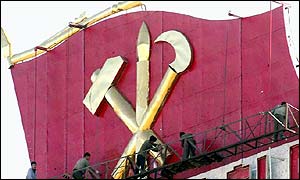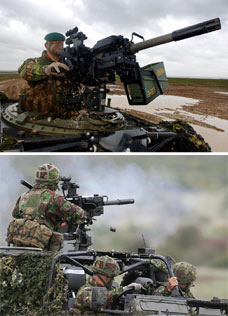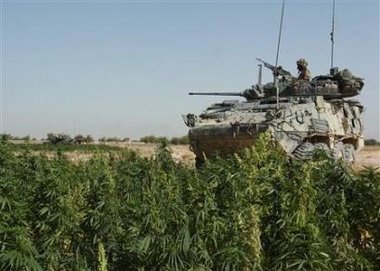CHINA, RUSSIA TELL BUSH THERE WILL BE NO MILITARY STRIKE ON NORTH KOREA
MILITARY PLANNERS "HAVE NIGHTMARES" ABOUT FIGHTING NORTH KOREA
HOW PAKISTAN AND THE US HELPED NORTH KOREA TO GET ITS NUKES
So what exactly can the UN and Security Council do to stop North Korea?
Incredibly, the answer appears to be : Not Much.
The only viable option under discussion to hav leaked out of UN talks today is to cut off the supply of "luxury goods" to Kim Jong-Il and the elite of North Korea.
Both Russia and China, who hold veto power on the Security Council, have dismissed the idea of any kind of military action.
The US proposed taking steps to stop and inspect all cargo and container ships leaving or entering North Korean waters in case of nuclear cargo or equipment that could be sold onto terrorist entities.
That proposal, too, was talked down, for good reason. All North Korea would have to do is tell one cargo ship to run the blockade and see if the US fires on it, which could trigger an international incident.
China, in particular, is said to be trying to water down the harshest actions demanded by the US for fear of the Kim Jong-Il regime toppling over, which China believes would lead to millions of refugees flooding across its borders.
For the moment, then,
the United Nations remains divided over what to do next to reign in North Korea and bring them back to the negotiating table.
North Korea, meanwhile, has said it's all up to the US : agree to one-on-one talks and they'll come back to the table. But this time, of course, North Korea will be in a far more powerful position to negotiate.
North Korea, meanwhile, has announced it will attack "international targets" (presumably in the US or South Korea) if the US doesn't unfreeze North Korea's international banking assets.
All options may be still on the table when it comes to North Korea, but there are few, if any, that will roll back the current reality that North Korea is now a communist dicatorship armed with nuclear weapons.
A Stratfor intelligence briefing yesterday spoiled the party for anyone imagining there will be
a US military attack on North Korea : "Whatever the political realities may seem to dictate after a North Korean nuclear test, an overt military strike ... is not in the cards....When U.S. military planners have nightmares, they have nightmares about war with North Korea."
Not only are many key US naval assets half a world away in the Middle East, but the US has both too many forces in South Korea and not enough.
More than 30,000 Americans are stationed over the border from North Korea, not enough for an effective ground invasion against a standing North Korean army of more than 1.2 million, and too many to risk North Korean counter-strikes on US military bases should an attempt be made to launch an air campaign against NK's nuclear facilities.
Most international military and intelligence analysts, at least today, agree that the only military option is : there is no military option.
Any B-2 bomber strikes on hardened bunkers will need to be followed up, and Stratfor suggests that North Korea would see such repetitive strikes as the US attempting a little regime change in North Korea. Not only are US troops in South Korea than placed at great risk, but North Korea is believed to have more than 10,000 artillery pieces that can reach Seoul.
North Korea is believed to have begun developing nuclear weapons "as an insurance policy against the hostile states on their doorstep,"
according to the UK Independent : They did it secretly, burying research facilities inside impenetrable mountains and buying the hardware to build a bomb off the shelf in the international black market. They achieved this in the midst of a famine that killed unknown numbers, by accepting international aid and diverting it to the military.
The North Koreans had no trouble in finding willing assistants in the international community. In 1975, the young Pakistani scientist AQ Khan had returned home, after working at a uranium enrichment facility in the Netherlands, and was looking for customers.
Khan, who developed the world's first Islamic nuclear bomb for Pakistan in a top-secret programme, in the mid-1980s opened his own private "supermarket" of nuclear technology transfers in which he sold secrets to anyone who would pay.
One branch was based in his Pakistan laboratories, where four or six scientists were - perhaps unwittingly - involved. But the hub was in Dubai, which took care of procurement and distribution, with the help of European businessmen.
One flight from Pakistan to North Korea carrying conventional weapons was intercepted by the Pakistani government, acting on a tip-off that more sensitive material was on board. They found nothing - apparently because Khan's people were informed in advance.
Through his network, Khan transferred to North Korea "nearly two dozen" P-1 centrifuges, and the more sophisticated P-11 centrifuges, according to President Musharraf, who debriefed the Pakistani scientist after his fall from grace. It has become apparent that North Korea was part of a global web of nuclear proliferation and was selling on to Iran.
President Musharraf has recounted in his memoirs, In the Line of Fire, that he became suspicious as soon as he took over responsibility for Khan's activities in 1999.
Musharraf denies that there was a government-to- government deal with North Korea for the purchase of conventional ballistic missiles, including technology transfers for hard cash. But he says: "I received a report suggesting that some North Korean nuclear experts, under the guise of missile engineers, had arrived at Khan Research Laboratories and were being given secret briefings on centrifuges."
These are the spinning machines which enrich uranium to levels suitable for production of a nuclear weapon. Musharraf and the Pakistani intelligence chief confronted Khan and he denied the report, "but we remained apprehensive".
Once Khan had been confronted, however, his programme went further underground. "It was becoming clearer by now that AQ was not 'part of the problem' but 'the problem' itself," writes Musharraf.
A SHORT HISTORY OF NORTH KOREA'S NUCLEAR WEAPONS PROGRAM AND HOW THE UNITED STATES HAS SOUGHT TO CONTAIN IT AND END ITNorth Korea began working towards a nuclear program, with the aim of arming itself with nuclear weapons in the mid-1980s. The knowledge and equipment is believed to have been sourced via the nuclear technology blackmarket run by the notorious Pakistani scientist AQ Khan. In 1986, North Korea managed to produce plutonium in one of its reactors.
By 1991, the US had begun a long series of talks and negotiations aimed at encouraging North Korea to stop its nuclear program, in exchange for oil and increased food aid. There was even talk of a final peace deal between the US and North Korea to officially end the Korean War (which has langered in a ceasefire for more than 50 years).
While the US played diplomat, North Korea allegedly 'separated' some 10kg of weapons-grade plutonium, which gave it enough fuel for at least nuclear bombs.
By 1993, North Korea had announced it intended to leave the nuclear Non-Proliferation Treaty now that a workable nuclear bomb was a reality. US President Bill Clinton ordered the military to begin planning how they could, and would, attack North Korea's nuclear sites.
At the same time, diplomatic talks continued, as an uneasy world urged the US not to attack North Korea. Kim Jong-Il agreed to a new framework which would see North Korea put its nuclear production on ice until President Bush entered the White House. Instead, the US would help North Korea build safe nuclear power reactors to generate electricity, on the condition they agreed to international inspections of the facilities and did not pursue nuclear weapons. The United States began shipping nuclear fuel to North Korea for use in its 'light water' reactors.
But, while they were standing back from generating nuclear weapons, North Korea pushed forward on developing the technology to deliver a nuclear warhead to international targets - testing its medium range missiles in late 1998.
By September 1999, North Korea had agreed to a moratorium on tests of its under-development long range missiles.
When Bush became president, Secretary of State Colin Powell announced the US would continue with the Clinton administration diplomacy gambit to stall North Korea's development of nuclear weapons and the missiles to launch them.
But within days of Colin Powell's announcement, President Bush said that negotiations with North Korea would not be as diplomatic as those undertaken by Clinton.
North Korea was cited as one of the key reasons why the US should spend hundreds of billions of dollars developing a missile defence shield through the rest of 2001, and in January 2002, Bush told the UN that North Korea was part of the 'Axis Of Evil', along with Iran and Iraq :
"States like these, and their terrorist allies, constitute an axis of evil, arming to threaten the peace of the world. By seeking weapons of mass destruction, these regimes pose a grave and growing danger. . . . In any of these cases, the price of indifference would be catastrophic."
But in April 2002,
Bush cleared a payment of more than $US90 million dollars to North Korea as part of the 1994 arrangement to build nuclear reactors in the country. But President Bush didn't insist that North Korea abide by international demands the facilities be open to snap international inspections.
The 'War On Iraq' was a way for the US to show 'outlaw regimes' like North Korea, Iran and Libya that the game had changed, and pre-emptive strikes were not just talk, but an actionable policy.
The Bush doctrine of pre-emption is believed to have encouraged Kim Jong-Il to withdraw from the NP treat in April 2003 and restart their reactor for the purposes of generating weapons grade plutonium.
In May 2003, President Bush announced that the US would not "tolerate nuclear weapons in North Korea...(We) will not settle for anything less than the complete, verifiable, and irreversible elimination of North Korea’s nuclear weapons program.”
Within two years, North Korea had some 15 kilograms of such plutonium and ramped up its development of medium and long range missiles.
Despite President Bush's refusal to one-on-one talks with North Korea, the six-party talks saw North Korea agreeing to dump its nuclear program in September 2005, in exchange for a package of new incentives.
But within days, the Bush White House had sabotaged the new agreements by declaring a bank and financiers tied to the North Korean Government Agencies as being connected with international money laundering. Once North Korea's assets were frozen, the six party agreement was voided.
By June, 2006, North Korea was believed to have generated plutonium sufficient to create up to 15 nuclear bombs.
In July, North Korea began testing its short and medium range missiles again, and put out the word to Russia and China that it was planning a test of its nuclear weapons, within months.
US Plans To Make Kim Jong-Il "Rue The Day" He Tested Nukes, US Plans Trade Blockade Under Guise Of Cargo InspectionsNuclear Tests Were China's "Nightmare Scenario" - Can't Cut Food Aid As Regime Collapse Would See Millions Of Refugees Flood Over China's Border With North KoreaUS Secretary Of Defence, Donald Rumsfeld, Sat On Board Of Company That Sold Nuclear Reactors To North KoreaNegotiations By Threat And Intimidation Won't Work Anymore, US Ambassador To The UN John Bolton Announces
US Rejects Direct Talks With North Korea, AgainNew Yorker Magazine : Kim Jong-Il's Canny Game With United States And South Korea


